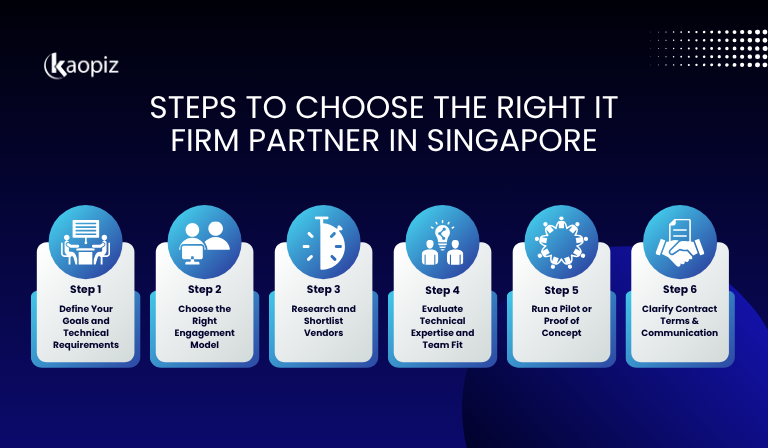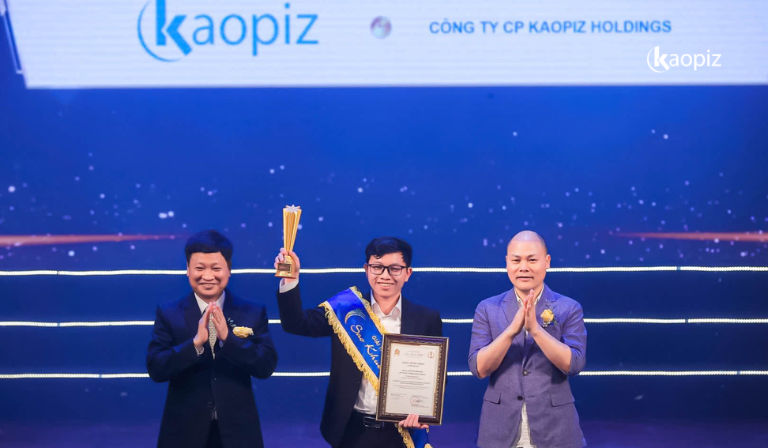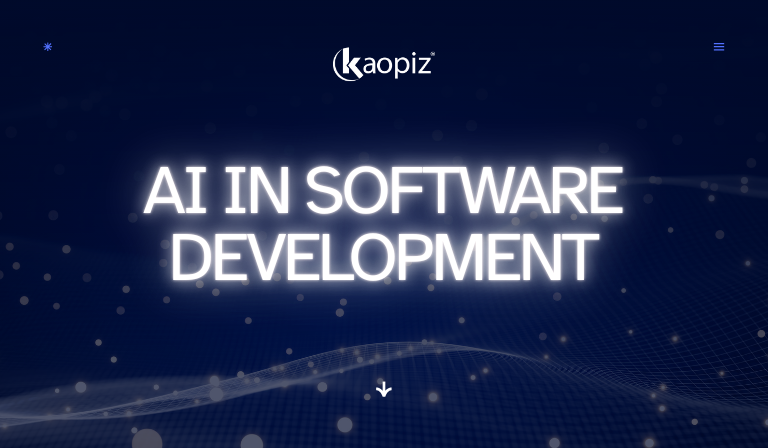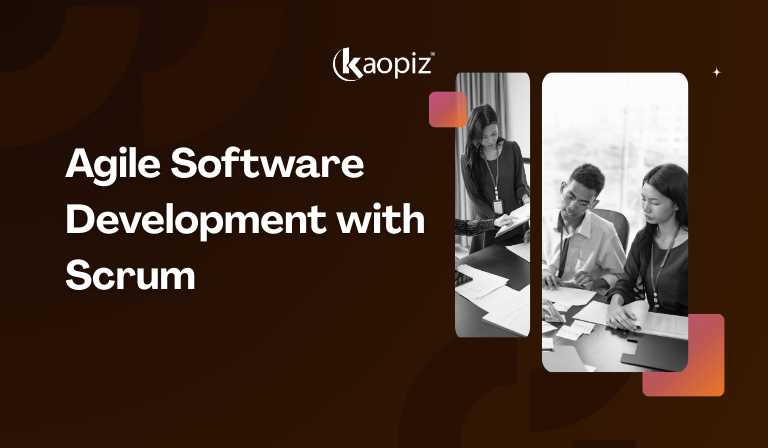How to Choose the Right Software Development Partner in Singapore [2025]
In today’s fast-evolving digital economy, businesses in Singapore face growing pressure to innovate, scale efficiently, and deliver seamless digital experiences. Whether you’re a fast-moving startup or a well-established enterprise, choosing the right software development partner is no longer optional—it’s a strategic decision that can make or break your success.
If you’re currently searching for a reliable IT firm and finding the process overwhelming, this 2025 guide is here to help. We walk you through everything you need to know—why more Singaporean companies are partnering with software development firms, how to evaluate your options, the essential steps to making the right choice, and common mistakes to avoid. Let’s dive in.
Table of Contents
- Why Companies in Singapore Need a Software Development Partner
- Key Criteria to Evaluate a Software Development Partner
- Technical Expertise & Tech Stack Alignment
- Experience in Your Domain (Industry Use Cases)
- Scalability & Team Size Flexibility
- Project Management Practices
- Security & Compliance Standards
- Pricing Models: Fixed, Time & Materials, Dedicated Team
- Client Testimonials and Case Studies
- Cultural Fit and Communication
- Steps to Choose the Right IT Firm Partner in Singapore [2025 Guide]
- Common Mistakes to Avoid When Choosing a Development Partner
- Why Vietnam Is a Preferred Choice for Offshore Software Development
- Why Choose Kaopiz as Your IT Outsourcing Partner?
- Conclusion
- FAQs
Why Companies in Singapore Need a Software Development Partner
Singapore’s fast-paced digital economy is driving businesses across sectors—fintech, retail, logistics, and healthcare—to innovate faster than ever. Many companies are turning to software development outsourcing partners to fill capability gaps, reduce costs, and accelerate delivery.
- Access to Talent and Cost Efficiency: Hiring skilled developers locally is both competitive and costly. A trusted partner gives you access to global talent without the overhead of full-time hires.
- Faster Time-to-Market: External teams can ramp up quickly, bringing specialized skills to help you launch products or upgrades faster and stay ahead of competitors.
- Focus on Core Business: Outsourcing development allows internal teams to focus on strategy, operations, and customer experience, instead of getting bogged down by technical execution.
- Access to Latest Technologies and Best Practices: Development firms stay current with the latest tools and methods, offering both technical expertise and practical insights from real-world experience across industries.
- Scalability and Flexibility: A good partner can scale with your needs—whether you’re building an MVP or expanding enterprise systems—with flexible team structures and pricing models.
Key Criteria to Evaluate a Software Development Partner
Choosing the right software vendor requires more than just comparing prices or portfolios. Here are the key criteria for software developers to find the right partner.
Technical Expertise & Tech Stack Alignment
When choosing a software development partner, one of the most critical factors to evaluate is their technical expertise and alignment with your preferred technology stack.

For example, if you’re building a scalable SaaS platform, choose a development partner enterprise in Singapore. Make sure they have experience with microservices architecture and RESTful API development. They should also be skilled in DevOps pipelines and tools like Docker and Kubernetes. For mobile app development, check if the team specializes in Flutter, React Native, or native iOS and Android.
A reliable partner doesn’t just use your tech stack. They stay updated on the latest tools, frameworks, and best practices. They should recommend the right technologies to meet your business needs. Their advice should boost performance and future-proof your software.
Experience in Your Domain (Industry Use Cases)
A custom software development partner with relevant industry experience can add significant value beyond just coding. They understand your domain-specific challenges, user behavior, compliance requirements, and business workflows, helping you avoid costly missteps and accelerate delivery.
For example, if you’re in fintech, look for partners experienced with payment integrations, data security standards, and regulatory compliance (such as MAS in Singapore). In retail or e-commerce, they should know how to build seamless omnichannel experiences, manage inventory systems, and integrate with POS platforms. In healthcare, experience with HIPAA compliance, medical data processing, or telemedicine platforms is crucial.
Review their case studies and ask for specific examples of projects they’ve delivered in your industry. A technology partner familiar with your business domain will require less onboarding, make smarter decisions, and ultimately deliver a more effective solution.
Scalability & Team Size Flexibility
As your project evolves, so will your resource needs. That’s why it’s essential to choose an enterprise software development partner in Singapore that offers scalable team structures and the flexibility to adjust team size based on project phases, deadlines, or budget shifts.

Whether you’re starting with a small MVP or scaling to a full enterprise solution, your partner should be able to quickly ramp up or down, adding developers, testers, designers, or DevOps engineers as needed. This flexibility is especially valuable for startups and enterprises in Singapore looking to stay agile in a competitive market.
Ask potential partners about their ability to allocate resources on demand, the average ramp-up time, and how they handle scaling for urgent timelines or long-term growth. A partner with a robust talent pool and proven resource management process ensures you won’t be limited by internal capacity as your business grows.
Project Management Practices
Effective project management is crucial for delivering software on time, within budget, and aligned with business goals. When evaluating software development partners, look for teams that follow modern project management methodologies such as Agile or Scrum.
Agile-based approaches promote iterative development, frequent feedback loops, and continuous improvement—ideal for dynamic business environments like Singapore’s fast-paced tech landscape. Scrum, in particular, helps teams break down large projects into manageable sprints with clear deliverables and review cycles.
A team with mature project management capabilities not only reduces risk but also ensures transparency, faster decision-making, and better collaboration, especially important when working with offshore or hybrid teams.
Security & Compliance Standards
Look for software development companies in Singapore with experience in implementing data encryption, secure authentication, role-based access control, and regular code audits. If you’re operating in regulated industries like finance, healthcare, or eCommerce, ensure they understand and comply with standards such as ISO 27001, GDPR, HIPAA, or Singapore’s PDPA.

Ask whether the partner conducts regular security testing (e.g., penetration testing, vulnerability scanning) and how they manage data privacy across development, staging, and production environments.
A reliable software development company will have documented security practices, clearly defined access controls, and a proactive approach to risk management, giving you peace of mind throughout the project lifecycle.
Pricing Models: Fixed, Time & Materials, Dedicated Team
Choosing the right pricing model is key to aligning your project scope, budget, and risk tolerance with your software development partner. Understanding the differences between fixed-price, time and materials, and dedicated team models will help you make an informed decision.
- Fixed-Price Model: Ideal for well-defined projects with clear requirements, timelines, and deliverables. You agree on a set cost upfront. While predictable, this model may lack flexibility if scope changes mid-project.
- Time & Materials Model: Best for projects where requirements may evolve. You pay based on actual hours worked and resources used. It offers greater flexibility and transparency, suitable for agile development and iterative releases.
- Dedicated Team Model: Recommended for long-term or complex projects requiring ongoing development. You hire a full or partial team that works exclusively on your project, giving you greater control, scalability, and deep integration with your business processes.
Each model has its pros and cons, and the right choice depends on your project’s complexity, budget, and management style. Good offshore software development partners should offer flexible engagement models and guide you toward the best fit for your goals.
Client Testimonials and Case Studies
Client testimonials and detailed case studies are powerful indicators of a software development partner’s credibility, reliability, and ability to deliver results. They provide real-world proof of the partner’s experience across industries, technologies, and project scope.

When evaluating a software development company, look for verified testimonials from past clients—preferably those in your industry or with similar business challenges. These reviews offer valuable insight into how the partner handles communication, deadlines, problem-solving, and ongoing support.
Case studies, on the other hand, go deeper by showcasing actual project outcomes. Ask for case studies relevant to your business goals. A development firm that’s transparent about its track record and open to sharing success stories is more likely to deliver consistent, high-quality outcomes.
Cultural Fit and Communication
Strong communication and cultural alignment are often overlooked but are critical to a successful software development partnership, especially when working across borders or with offshore teams.
Your partner should not only speak your language but also understand your business culture, work style, and expectations. A good cultural fit ensures smoother collaboration, fewer misunderstandings, and faster problem resolution. This is particularly important for companies in Singapore working with teams in countries like Vietnam, where cultural compatibility and shared business values can make a significant difference.
Clear communication practices—such as regular check-ins, transparent reporting, and responsiveness—are essential. Look for partners who use tools like Slack, Jira, or Microsoft Teams and who provide dedicated points of contact like project managers or BrSEs.
Steps to Choose the Right IT Firm Partner in Singapore [2025 Guide]
If you are wondering about how to choose the right software development partner, following these steps will help ensure a smooth and successful partnership in 2025.

- Step 1: Define Your Goals and Technical Requirements
Start by outlining your business objectives, project scope, budget, timeline, and preferred technologies. Clear requirements help filter suitable tech outsourcing firms and set expectations from the beginning.
- Step 2: Choose the Right Engagement Model (onshore, offshore, nearshore)
Decide whether onshore (Singapore-based), offshore (e.g., Vietnam), or nearshore (Southeast Asia) outsourcing fits your needs. Offshore and nearshore development is often more cost-effective, while onshore offers closer cultural and time zone alignment.
- Step 3: Research and Shortlist Vendors in Singapore and Asia
Use directories like Clutch or Enterprise Singapore. Then, shortlist 3–5 companies with proven experience, service offerings, strong portfolios, and relevant industry knowledge.
- Step 4: Evaluate Technical Expertise and Team Fit
Assess whether the partner has relevant experience with your required tech stack and project type. Consider their ability to scale with the team if needed and ensure they can integrate seamlessly with your internal workflows.
- Step 5: Run a Pilot or Proof of Concept (Optional but Recommended)
If you’re unsure about a long-term commitment, consider starting a small pilot project. This allows you to assess the partner’s performance, code quality, communication, and responsiveness in a real-world scenario.
- Step 6: Clarify Contract Terms and Communication Protocols
After choosing a partner, finalize terms like scope, pricing, IP, support, and security. Also agree on communication tools, escalation paths, and project governance to ensure transparency and accountability throughout the engagement.
Common Mistakes to Avoid When Choosing a Development Partner
Selecting the wrong software development partner can lead to delays, budget overruns, and poor product quality. To ensure a smooth collaboration and successful outcome, avoid these common pitfalls:
| Mistake | Why It’s a Problem | Suggested Solution |
|---|---|---|
| Choosing Based on Price Alone | The cheapest option may lead to poor quality, delays, and costly rework. | Balance cost with experience, technical capability, and long-term value. |
| Overlooking Technical and Domain Expertise | Lack of relevant experience can result in inefficient or unsuitable solutions. | Choose partners with proven experience in your industry and tech stack. |
| Ignoring Post-Launch Support | No support after launch can cause issues with maintenance, bugs, or scaling. | Clarify post-launch support scope, response time, and maintenance plans in the contract. |
| Poor Communication Expectations | Miscommunication leads to delays, errors, and frustration. | Establish clear communication tools, meeting schedules, and escalation paths from day one. |
| Not Reviewing Contracts and IP Clauses | Ambiguity in ownership or terms can lead to legal and operational risks. | Carefully review contracts to define IP rights, code of ownership, confidentiality, and exit terms. |
Why Vietnam Is a Preferred Choice for Offshore Software Development
More and more Singapore businesses are outsourcing to Vietnam, which is quickly emerging as one of the leading offshore software development hubs in Asia. Here’s why Vietnam is one of the best countries for IT outsourcing in 2025:
- Geographic & time zone advantage for Singapore: Vietnam’s proximity and similar time zone allow for real-time collaboration, faster communication, and easy travel when face-to-face meetings are needed.
- Cost-effective yet high-quality talent pool: Vietnam offers a large pool of skilled developers at competitive rates, with strong technical education and growing experience in international projects.
- Strong cultural compatibility and English communication: Vietnamese teams are culturally aligned with Singaporean businesses and have good English communication skills, ensuring smoother collaboration and fewer misunderstandings.
- Emerging as a nearshore development hotspot in SEA: Backed by government support and global investment, Vietnam now has many leading nearshore software development partners in Southeast Asia.
Why Choose Kaopiz as Your IT Outsourcing Partner?
With over a decade of experience and a proven track record in the global IT outsourcing services market, Kaopiz is one of the top IT outsourcing partners for Singapore businesses.

Here’s what sets us apart:
- 500+ Projects Delivered, 98% Client Satisfaction Rate: We’ve completed over 500 projects for clients across industries—including retail, finance, logistics, healthcare, and manufacturing—with a remarkable 98% customer satisfaction rate.
- Bilingual Teams with Cross-Cultural Expertise: Our engineers, business analysts, and Bridge SEs are fluent in English and Japanese, and well-versed in working with Singaporean and global clients, ensuring smooth communication and strong cultural alignment.
- Scalable, Flexible Engagement Models: From short-term MVP builds to long-term enterprise system development, we offer tailored models including fixed-price, time & materials, and dedicated team setups—adaptable to your changing needs.
- Full-Service Capabilities Across Technologies: Whether you need web/mobile app development, cloud migration, AI development, or system modernization, Kaopiz has deep expertise across modern tech stacks (Java, .NET, Python, React, Flutter, AWS, Azure, and more).
- Certified Quality and Security Standards: As an ISO 27001-certified and ISTQB Platinum Partner, we follow the best practices in software quality assurance, information security, and project governance.
Then, looking for a software development partner in Southeast Asia? Contact Kaopiz today to discuss your project goals and see how we can bring your ideas to life.
Conclusion
Understanding how to choose a software development partner—by evaluating technical expertise, domain experience, communication practices, and cultural fit, and by following a structured selection process—can significantly increase your chances of success.
Moreover, for Singaporean businesses, nearshore destinations like Vietnam offer an ideal blend of cost-efficiency, quality, and proximity. Kaopiz stands out with a strong track record, scalable teams, and a deep understanding of enterprise needs. Whether launching, modernizing, or scaling, the right development partner drives sustainable innovation.
FAQs
A tech partner primarily provides technical expertise, helping you build, scale, or maintain your software based on your requirements. A solution partner, on the other hand, takes a more strategic role, offering end-to-end guidance from business analysis and system design to post-launch support. They work closely with your leadership team to deliver tailored solutions that solve real business problems, not just technical tasks.
In Singapore, custom software development can range from SGD 150 to 300+ per hour, depending on the agency and expertise level. In Vietnam, offshore development typically costs SGD 30 to 80 per hour, offering significant cost savings without compromising quality. For example, a mid-sized custom web platform that might cost SGD 200,000+ in Singapore could be developed for SGD 50,000–100,000 in Vietnam with the right partner.
Yes. Kaopiz offers hybrid engagement models that combine onshore collaboration (e.g., with clients in Singapore or Japan) and offshore development teams based in Vietnam. This approach gives you the best of both worlds: local presence for communication and strategy, and offshore scalability for efficient execution. We also provide bilingual Bridge SEs and project managers to ensure seamless coordination across teams.
Trending Post





















No Comments yet!